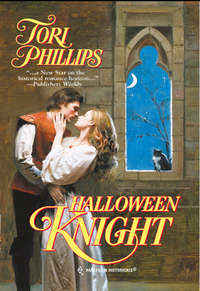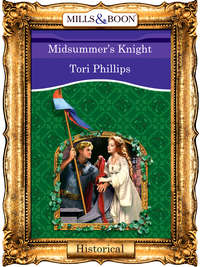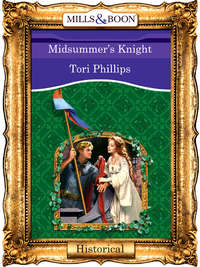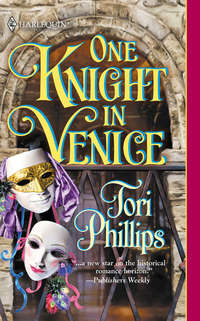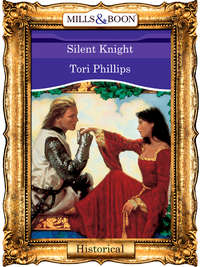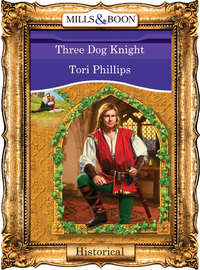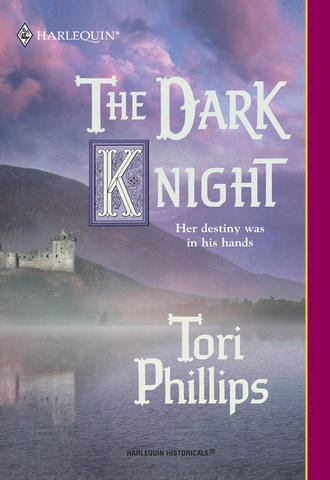
Полная версия
The Dark Knight
Celeste and Guy exchanged quick glances. For decades the Cavendishes had feared just this sort of attack from the Tudor upstarts who had snatched the crown of England nearly seventy years ago. Someone must have discovered the family’s secret of their Plantagenet blood and their remote claim to the throne through their descent from King Edward IV of blessed memory. Both King Henry VII and his son, Henry VIII, had spent their lifetimes wiping out the last known traces of the realm’s lawful rulers. But to have visited their obsessive vengeance upon an innocent young woman was beyond perfidy—yet a craven trick well practiced by the uneasy Tudor kings.
Guy squeezed Lucy’s hand. “What happened then?”
Lucy drew the furred robe tighter around her. “The soldiers bound us, even though Tonia fought them. Then they bundled us into a dark coach and drove off into the night.” She grimaced. “Their hands were not gentle nor their tongues. They called us traitors, whores and a great deal of worse filth.”
Anger at the indignities forced on her daughter and her companions replaced Celeste’s fear. Striving to keep her boiling temper out of her voice, she asked, “Did those churls…touch you in an unmannerly way?”
Again Lucy shook her head. “They said they would ravish us if we did not obey their orders, but they never dared to carry out their threats.”
Blue fire blazed in Guy’s eyes. “Where did the knaves take you?”
“To York, though we did not know it at the time. The carriage’s windows were covered with a heavy black cloth. We were blindfolded inside a mews before they led us into the courtroom.”
“They convened a trial against you?” A muscle throbbed along Guy’s jawline.
“Aye, my lord,” the girl answered. “Three bearded men in black robes questioned each of us in turn. Hour upon hour they harangued us about our religious beliefs and our little nunnery. They wanted to know if we held allegiance to the Pope in Rome or to King Edward. They asked us if we read the Bible and what prayers we recited. They even asked us if we danced with the devil or practiced witchcraft. At one point, I fainted from hunger and thirst.”
Though Lucy’s account was dire enough, Celeste felt a small relief that no mention had been made of the Cavendish’s Plantagenet heritage. “Surely, ’tis no treason nor witchcraft to pray to God. What fault could they find in that?”
Lucy’s voice sank into a hoarse whisper. “They accused us of being Catholics, of practicing an outlawed religion and going against the express decrees of the King.”
“And thereby you could be called traitors,” Guy rumbled. “But you are free now. Why not our Tonia?”
At the mention of her friend’s name, Lucy’s eyes again filled with tears. “Alas, they convicted her, Sir Guy! They said that since she was the eldest one of us and because she came from a great family, they would make an example of her to discourage any other members of the nobility who had popish leanings. Those horrible judges condemned sweet Tonia as a traitor and sentenced her to death.”
Celeste sank into her chair, and ice encased her heart. “Mon Dieu, say ’tis a trick. ’Tis a lie.”
Lucy’s tears spilled down her cheeks. “Not so, good lady. Afterward, the soldiers turned the rest of us out into the street without so much as a groat among us, but not Tonia. The last I saw of her, they led her through another door and I know not what they have done with her.”
Celeste swallowed down the lump in her throat. “I pray God that she still lives. They would not dare to execute the niece of the Earl of Thornbury—not without hearing an appeal for her defense.”
Guy stood. “Young King Edward thinks he is doing God’s will by cleaning out so-called popish heresies, but the conniving scullions who whisper in his ear know better. ’Tis earthly power they crave, and they seek to wrest it from the nobility by skullduggery, lies and intimidation. There is no gutter too low for them to wallow in.”
“And Agatha, Margaret and little Nan? Where are they?” Celeste asked, though her thoughts rested only on her daughter’s fate.
“We were taken in by Margaret’s cousins who live in York, though that family gave us grudging hospitality, lest we infect them with our shame.” Lucy drank the rest of her cooling ale. “They supplied us with enough coin to hire horses and escort to see us home. I came directly to you, Sir Guy. Mayhap, there is still time to save Tonia.”
“If not, then I swear there will never be world enough or time to slake my vengeance,” he muttered.
The tone of his voice and the look in his eyes frightened Celeste almost as much as her fear for Tonia. If Guy is rash, I could lose both husband and child within the month.
Leaving Celeste to care for Lucy, Guy sent messengers to the nearby homes of his son, Francis, and his nephew, Kitt, heir of the Earl of Thornbury. Guy chose not to involve his powerful older brother just yet until he knew further particulars of Tonia’s whereabouts. What Guy needed now was the youth, strength and stamina of the younger Cavendish males. He intended to be on the road to York by dawn’s light. Based on Lucy’s account of the time that had elapsed between her release and her arrival at Snape Castle, he reckoned eight days had passed since that farce of a trial. Time enough for Tonia’s execution. He buried that possibility in the depths of his mind. She was still alive, he told himself, as he sharpened his sword. He would have received word by now if she were not.
If Tonia is indeed dead, falsely accused and even more falsely murdered, then God save the King—from me!
Chapter Three
The rattle of the key in the rusty lock of her cell door woke Tonia with a start. A thin stream of early morning sunlight filtered through the arrow loop window. Sitting up on the cold floor, Tonia massaged the crick in her neck where she had fallen asleep against the stool. A sudden rush of adrenaline shot through her. ’Tis morning and he’s come for me! She struggled to her feet before the executioner could open her door. She must present to him a cheerful face and as much bravado as she could muster.
When the man stepped inside her chamber, she saw that he still wore his black hooded mask though he had doffed his huge cape, making him look a little more human than an avenging dark angel. Despite the morning’s chill air, the sleeves of his muslin shirt were rolled up to his elbows, revealing deeply tanned skin the color of acorns. Droplets of water dripped from his hands, indicating that he had just washed. Her gaze locked on to the slim dagger in a leather sheath that was strapped on his left forearm. She gulped.
Glossy black hair curled from under his hood and a single golden loop winked in the light from his left earlobe. Around his neck, he sported a jaunty red neckerchief made from a piece of ragged silk that she had not noticed last night. The spot of bright color cheered Tonia a little, giving her the courage she desperately needed.
She swept him another low curtsy. “Good morrow, Master of Death.”
He halted at her greeting. “Good morrow, my lady.” He crossed his arms over his chest but said nothing more.
Does he expect an invitation to strangle me? Tonia’s taut-strung nerves almost made her titter at the idea. Two can play at this game. She folded her hands in a pose of tranquillity that was at odds with her true feelings, and waited. For several eternal minutes the two stared at each other across the width of the small room.
Just when Tonia began to despair of this ploy, the executioner looked over her head at a spot on the bare wall and spoke. “’Tis daybreak, my lady,” he informed her in a low gruff tone.
Please, dear Lord, soften this man’s heart. Tonia feigned indifference. “Truly? I cannot tell. The window is too narrow and high for me to see out.”
“The sun has risen over the mountain,” he muttered, still not looking at her.
Methinks he is as nervous as I am. She gave him a little smile. “I long to see that glorious sight just once more.”
He pointed to her window. “Stand on the stool and look for yourself.”
Tonia took a deep breath. “Is there a walkway that faces east?”
He nodded once.
“Gentle headsman, pray escort me there that I may see the sun as a free person sees it and not through bars like a caged sparrow. ’Tis a little thing I ask.”
He said nothing, nor did he move.
Tonia braced herself in case he should suddenly spring at her and choke her before she could evade him. She was a Cavendish and would not easily yield up her life no matter what that piece of royal parchment decreed.
When the silence between them had stretched to the breaking point, Tonia continued. “If you were me, wouldn’t you desire one last taste of freedom?”
Finally he turned his masked face toward her and dropped his arms to his sides. “Aye, that I would.” He swung the door wider. “Come, then, lady, and look your last, but walk softly, the walls of Hawksnest are old and crumble easily.”
Now she laughed aloud. “You are afraid that I will fall and break my neck before you have the chance to do it?”
“The fall would frighten you, my lady” was his only reply. He held the door for her as if he were escorting her to a banquet instead of to her doom. As she passed him, he touched her elbow lightly. “To the left.”
Her skin prickled at his touch.
It was after nightfall when Tonia had been brought to this ruined fortress. Since then, she had never been allowed to leave her cell. As she walked toward the spiral staircase at the far end of the corridor, her spirits grew lighter with each step. She had not realized how much she had missed the fresh air and the warming rays of the sun until this moment. Savoring the morning’s light, she slowly mounted the winding stairs until they suddenly opened onto a parapet. As she stepped out onto the narrow walkway a strong arm around her waist checked her progress.
Her masked escort pointed to the deteriorating retainer wall, then kicked at the topmost stone. Without protest from the centuries-old mortar, the rock tumbled over the side. Tonia heard it bounce its way down—a long way down.
“’Tis dangerous, Lady Gastonia,” he murmured behind her. His breath tickled her neck, causing the most unexpected sensation in the pit of her stomach. “Lean back on me.”
Despite her distrust of him, Tonia laid her head against his chest and relaxed in the crook of his arm. Heat emanated from his body, warming her. His rapid heartbeat drummed in her ear; the feel of his hard muscles rippling under his shirt quickened her pulse. When his grip tightened around her, she shivered, though not from the cold wind. Laying her hand on his bare arm, she was aware of the quiet strength within him. He tensed under her fingers. Hastily she withdrew her hand and used it to shield her eyes as she looked out on the dawn’s gilded-pink glory.
This side of the fortress hung over a deep ravine that cut between two mountains. The rising sun’s beams turned a small stream at the base into a rivulet of molten gold. A thin curling mist rose from the water’s surface. Bright blue colored the sky, with a puff or two of white clouds in the distance. A large hawk, his great wings spread wide, drifted on the up-drafts in a lazy circle, searching for his breakfast. The day promised to be the most beautiful one that Tonia had ever beheld. She sighed.
“It pleases you?” he asked in a husky whisper.
“Aye,” she murmured as her gaze drank in the beauty of nature.
They stood pressed together in silence for some time. Tonia wished that the moment would go on forever. She felt content and protected, an odd sensation since she was in the arms of the man who would kill her, perhaps even within this very hour.
Tentatively he fingered a tendril of her unbound hair that fluttered against her cheek. He smoothed it between his fingertips, before tucking it behind her ear.
“I wondered what it felt like,” he explained in a hoarse whisper.
Tonia’s skin tingled with pleasure where he touched the tips of her ears. A shiver of excitement rippled down her spine. She gave herself a little shake. These unexpected stirrings within her would never do—not now. She had to keep her wits sharp if she hoped to buy more time. Stretching on her toes, she ventured to peer over the edge of the unstable wall at the dizzying drop below them.
“What do you seek, my lady?”
Glancing over her shoulder, she held him in her steady gaze. With her heart thudding in her throat, she forced a smile. “I was wondering—where will you bury my body?”
Her guileless question struck him like a dash of ice water in the face. For a few precious moments, Sandor had almost succeeded in forgetting who he was and why he was standing on the edge of the world with a butterfly in his hands.
Behind his mask, he blinked. “I had not given thought to that,” he confessed with honesty. No one had said anything to him about disposing of her body—only cutting out her heart.
She turned in his arms so that she faced him. Sandor instinctively pulled her closer to him. The wall walk was far too narrow for much maneuvering. He looked down at her. The wind whipped her dark cloud of hair in all directions, making her seem almost otherworldly. Her lithe body molded against his. His blood, already heated by her presence, sizzled through his veins.
The lady cocked her head. “The warrant plainly states that you are to bury me deeply in the ground.”
He couldn’t help smiling at her, though his heart hung like a stone at her words. “I am glad that one of us can read that paper. I dare not disobey the King’s commands,” he bantered.
Her lower lip trembled a little in the most provocative way. He was tempted to kiss it, but common sense and his lifelong discipline to distance himself from the unclean gadji stopped him. He was expected to kill her, and he had to keep reminding himself of that increasingly disagreeable fact.
She arched one raven’s-wing brow. “’Tis a great shame that my time with you will be…ah…so short, for I could teach you your letters.”
Sandor would have liked that. Unlike the rest of his clan, he had always harbored a secret desire to read and write. And the beautiful gadji would have been a very pleasing teacher. Banish such foolish woolgathering, Sandor! Remember that she is a walking dead person.
He looked over her shoulders at the mountain peak on the far side of the valley. “I am Rom. We have no need for schooling since there is no holy book for us to read.”
Lady Gastonia stared up at him with surprise in her sapphire eyes. “You do not have the Bible?”
Her question amused him. “Our storytellers say that in the beginning the Lord God handed out His laws to all the peoples of the world. The Jews in the Holy Land wrote down the laws on stone tablets, then later in the scrolls of their Torah. The Christians wrote God’s words in their Bible. The Moors of the desert wrote their laws in the Koran, but the Rom?” He shrugged with a wry grin. “My people were, as always, very poor and they had no paper, so they wrote down God’s laws on cabbage leaves. Unfortunately, a hungry donkey came along and ate up the leaves. That is why we have no book to read.”
She regarded him for a long moment then said, “’Tis a tale for children. It cannot possibly be true.”
He brushed the tip of her nose with his forefinger. He couldn’t help himself. “Who knows? But ’tis a good story all the same.”
She moistened her lips with the tip of her delicate pink tongue. “I would love to hear more of your stories, monsieur. The day is still very young.”
He frowned. Why did she have to remind him of the time? He must be on his way to London before nightfall. His cousin’s stay in the Tower’s dank pit grew longer because of his procrastination. Sandor gritted his teeth.
He guided her toward the open archway that led back inside the fortress. “We burn daylight, my lady. Your company has made me forgetful of my duty.”
She gasped as he pushed her down the dark stairway. “You are going to…to do it now?”
He sighed heavily, his voice filled with anguish. “My will is not my own.”
Spinning around, she placed her hands against his chest. Her warmth seeped through his cold skin, straight to his heart. He stopped in his tracks.
“One thought more before you snuff out my life,” she said in a rush. “The day is cold, the ground probably frozen. No doubt ’twill take you several hours to dig a grave that is deep enough to hold me. If you allow me to sit by your side and keep you company, perchance your work will seem lighter and will take less time.”
“You want to watch while I dig your grave?”
Swallowing, she nodded slowly. “Would you rather have my stiffening corpse by your side? Cold, grim comfort indeed for such tedious work. Let me live a little longer and I could talk with you, mayhap even sing you a song or two, though I must confess I have the voice of a raven, not a lark.”
He rubbed the back of his neck while he pondered her latest request. How had things become so complicated? Yet, her argument had a point. Sandor most certainly preferred to keep her alive for as long as possible.
“By my troth, yours is a silver tongue, my lady. I feel sorry for your future husband—” He stopped when he realized that she would never have the chance to marry. “Forgive my foolish words. I must be light-headed from want of food.”
She gave him a sweet smile. “There is nothing to forgive. I forswore the joys of marriage when I dedicated myself to God. I always expected to die a virgin—just not quite so soon as now.” She stared down at her feet.
Appreciating the beauty of the woman before him, Sandor thought all chaste vows, no matter how religious, were a waste of the good God’s gifts. Since he could not think of anything to say in reply, he merely guided her back toward her cell. She stopped at the door.
“In good Saint Michael’s name, Master Headsman, tell me now what you intend to do with me so that I may prepare myself.” Her shoulders shook a little.
He blew out his cheeks. “Break my fast—and yours if you have an appetite for it,” he snapped more roughly than he had intended.
Gazing up at him, her eyes moist with a film of unshed tears, she said, “Aye, sir, I would be grateful to share another meal with you.”
Not trusting himself to say anything else, Sandor pointed to her stool. After she crossed the tiny room and took her seat, he strode quickly down to the guardroom at the end of the passageway, grabbed up his saddle bag and wineskin, and returned to the lady’s chamber before she had the sense to realize that he had left the door wide-open. Of course, there was no place she could go on foot unless she took it into her head to jump off the parapet, an idea that Sandor sincerely doubted. When he stepped though her doorway, he found her in silent prayer.
Respecting her private devotions, he busied himself with unwrapping the food he had bought at the village at the bottom of the mountain pass. Despite his attraction to this lady, his deep-seated prejudice toward all gadje caused him to separate her food from his. If she did not finish the wedge of cheese he cut for her or the chunk of the brown bread that he pulled from his loaf for her, he could never eat the leftovers himself. While he poured wine into her cup and watered it, he marveled at his peculiar situation—he could kill this gadji but not eat the food that she had touched lest she pollute him. When their simple breakfast was ready, he cleared his throat to attract her attention.
“Amen,” she said aloud, then made the sign of the cross—a popish ritual that even Sandor knew had been forbidden by the King’s religious laws. For this simple act, she had been condemned to death.
She smiled when she saw the food on the small table before her. “’Tis a feast,” she murmured before biting into the hard cheddar.
With approval in his heart, Sandor watched her enjoy their small meal. “My grandmother always said that a good woman was one who ate a poor dish and praised it for its richness.” Actually, old Towla Lalow had described this trait as belonging to a good wife, but Sandor saw no reason to mention that fact to his victim.
The lady laughed. “Methinks I would like your grandmother, for she sounds like a very wise woman.”
“She is,” he replied softly, remembering the puzzling fortune Towla had told him only a few days ago.
They ate the rest of their breakfast in a silence that was more companionable than strained. The lady’s quietude impressed Sandor, for he knew that his wife, who had died in childbirth two years ago, would have chattered nonstop like a witless jay if she had faced the same fate that this lady faced. Remembering his loss, he again blessed God for taking his wife with quick, painless hands. For her sake, he would do the same for Lady Gastonia when the time came. He was relieved to see that the gadji left no scraps or crumbs.
Slinging his bag over his shoulder, he rose and beckoned to her. “Come, my lady, if you wish to watch me…work.” He could not bring himself to name his macabre task.
With a heart-stopping smile she followed him out of her dark prison.
Fortified by the food and buoyed by her reprieve, Tonia almost skipped along the uneven paving stones as the executioner led her into the sunshine. Crossing the bare courtyard, she glanced back at the place wherein she had spent the past week. The dilapidation of the mountain fortress surprised her. The wing that housed her cell was the only section of Hawksnest that still had four standing walls. The second and third levels of the fortification had long since tumbled down the sides of the ravine. Until now, Tonia had thought she had been kept in a more substantial building. From its air of desolation, she guessed that Hawksnest had not been used for well over a hundred years, perhaps longer.
She nodded to herself. Considering the precise directions of her death warrant, the King and his overzealous minions intended that her execution would not only be done in secret, but that she would virtually disappear from the face of the earth—her resting place unknown, unmarked and unmourned. She knotted her brows together in a frown. ’Twas meant to be a cruel punishment for her family as well as for herself. How could men who professed to love God do something so pitiless as send her to eternity without the comfort of shriving her soul? Their perfidy was doubly damned for forcing her dear parents to grieve her unknown fate for the rest of their lives.
She cast a quick glance at the tall man who walked ahead of her. Perhaps he would send a message to her father. Then Tonia remembered that the headsman could not write. Perhaps he would allow her to send a last letter to her family, telling them where they could find her grave. She chewed on her lower lip. Since her too-intriguing executioner couldn’t read, he didn’t know that her grave was to be unmarked. She decided that she would not enlighten him; in fact, she would do exactly the opposite.
Just then, he veered to the left toward what remained of the stable block. He whistled and a soft whinny answered him. Glancing over his shoulder to Tonia, he smiled at her beneath the ominous black mask.
“’Tis Baxtalo, my horse,” he explained, his tone much more lighthearted. “He must be wondering what happened to me.”
Tonia stopped outside the stable while the man disappeared through the dark doorway. She heard him speak a strange language to his mount. Tonia gave a quick look around the now-empty courtyard. Ahead of her, she saw the yawning portal that led to the outside world—and freedom. Her instinct to run almost overwhelmed her until her common sense prevailed. If she bolted now, he could easily catch her, especially when she had no idea of the lay of the land beyond the fortress’s walls. The executioner might decide that she was too much trouble and kill her on the spot. Tonia’s best hope for her life was to stretch out the time as long as possible, as well as win her executioner’s trust and goodwill.
Hearing the horse’s hooves scrape against the stones, Tonia looked back toward the stable. Grinning with pleasure, the man led out a spirited gray stallion with charcoal mane and tail. At Snape Castle, Tonia had grown up riding the best horses that her father could buy, and she recognized a good animal when she saw one. In fact, the quality of the headsman’s mount surprised her. The execution business must pay exceedingly well, she thought. Then she remembered that the man had said that he was not an executioner.



